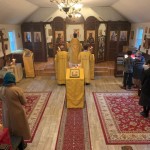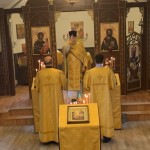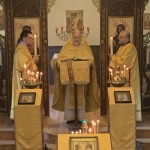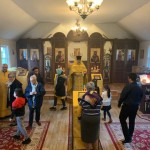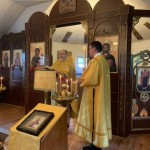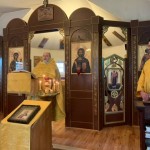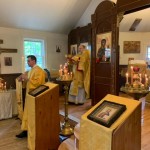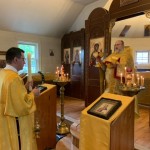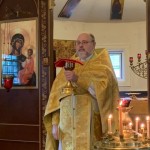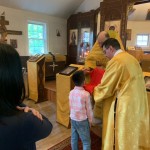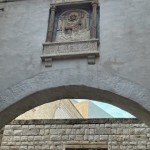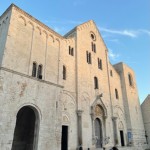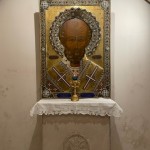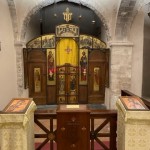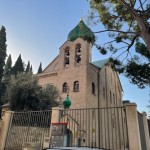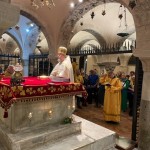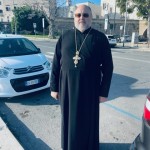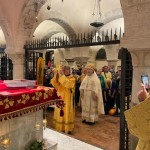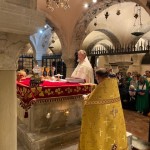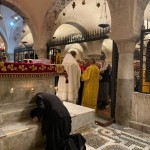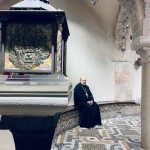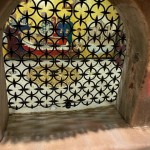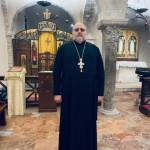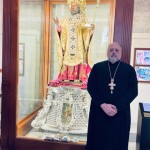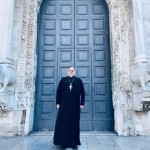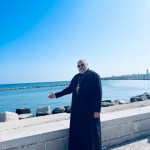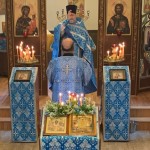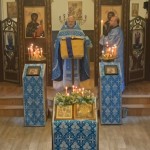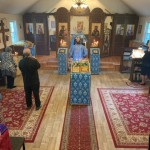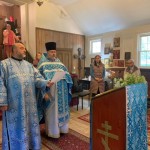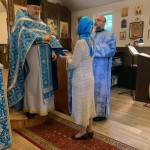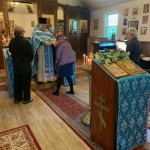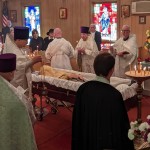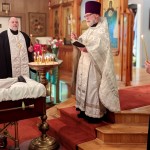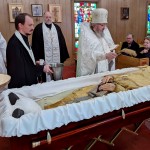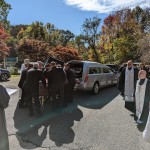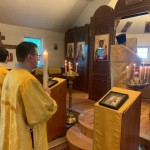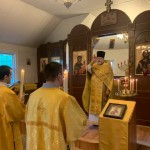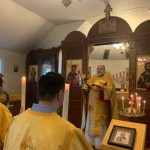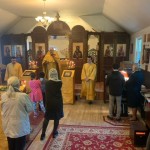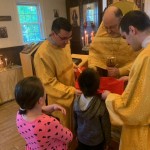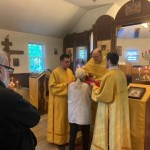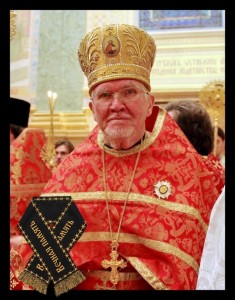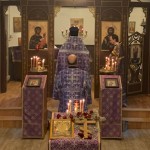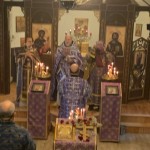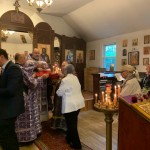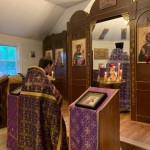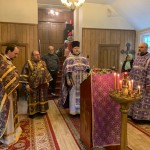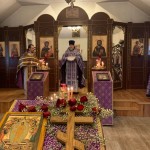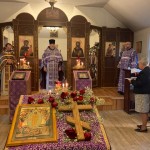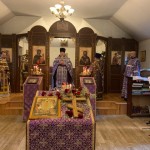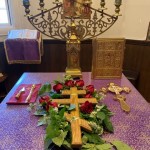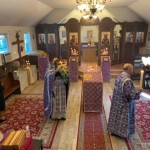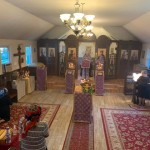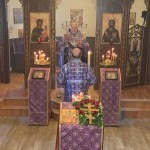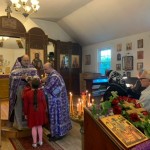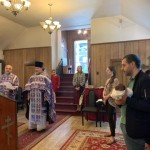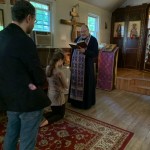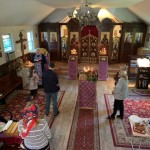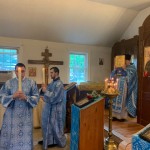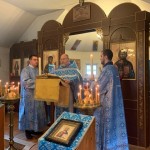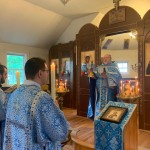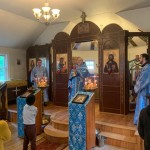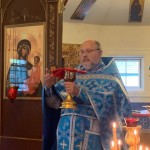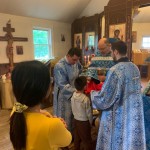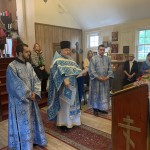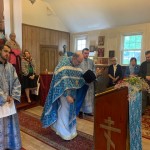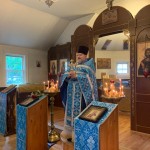On November 13, on the 22nd Sunday after Pentecost, Rector of St. George Church, Archpriest Igor Tarasov served the Divine Liturgy in our parish temple. After the readings from the Sacred Scripture he preached the following homily:
“Dear brothers and sisters in Christ! The Gospel lesson we have just heard is about casting out the demons from a possessed man in the country of the Gadarenes (Lk. 8, 26-39). This story is very impressive and is presenting us a number of pictures. We hear about the dialogue between our Lord Jesus Christ and the demons, we see that the demons entered a herd of swine which runs violently down the steep place into the lake and perishes there. Then we learn that the man freed from the evil spirits became sound and in his right mind. Let us now reflect upon this story from the Holy Gospel”.
“Being Orthodox Christians we certainly believe in the existence of the evil spirits. Unlike some modern Christian communities who do not take into account the existence of the devil or even reject his personal being, we do believe that he and his evil angels exist. This is why when we say the Lord’s Prayer, we finish it with the words “and deliver us from the evil one”. Many other denominations just say “from evil”, thus leaving a room for discussion, whether the devil is a real person or just some abstract evil power. For us he and his dark followers are personalities fighting against God and having a powerful influence upon us. Such an influence of the evil one was especially strong in the times before the coming of our Lord Jesus Christ. People lived under the direct power of their sinful passions and were the toys for the devil. In some instances the evil spirits even entered the bodies of the people, as it was described in today’s Gospel”.
“But with the coming of our Lord and Savior Jesus Christ into this world the power of the evil one became seriously weakened. Even before His death on the Cross and His Resurrection which became the victory over the sin and death, the triumph over the forces of evil, the Lord chased out the devil from human life. In today’s Gospel story we hear that the Lord delivered the possessed man from the demons. We should also notice that the demons were afraid of Jesus. The possessed man fell down and begged Christ not to torment him (Lk. 8, 28). The demons also beg Jesus not to send them out into the abyss (Lk. 8, 31). Thus, they recognized Jesus to be the Lord of the universe and they had to obey Him. This should remind us that the power of the devil is limited, and he is not as powerful as the Lord. God is the Creator and the demons are just His creatures that raised against Him”.
“However, Jesus permitted the demons not to be cast out into the abyss, but to enter the herd of swine. This tells us that the Lord allows the devil and his angels to stay in this world before His second coming, before the Last Judgment. Then the devil and his demons will be finally condemned and sent out into the everlasting fire. But before that the Lord permits them to perform their evil deeds and to attack us. But the Lord gives us a powerful assistance in this spiritual warfare. The power of the risen Christ which is given to us Christians is able to chase the devil away from us. Holy disciples of the Lord rejoiced that they had the power to cast out the demons, the same way as Jesus could cast them out. Today we commemorate several disciples of Christ who were among the 70 Apostles. So, the Gospel says that “the seventyreturned with joy, saying,” Lord, even the demons are subject to us in Your name.”” (Lk. 10, 17). Same power is granted to the whole Christian Church. But many of us are not able to use it because we are often prisoners of our passions and we are too weak to be the agents of the divine power”.
“Dear brothers and sisters! The devil has a great influence in this earthly life, so he is even called the prince of this world. His evil demons are constantly attacking us and tempting us to give in to our passions, to commit sins. But the power of the risen Christ, the power of His Life-creating Cross and the divine grace are much stronger than all the intrigues of the evil one. Last Sunday’s Epistle lesson instructs us that if a man has been crucified with Christ, it is no longer he lives, but Christ lives in him (Gal. 2, 19-20). That means that if we live Christian life and fight our sinful passions, Christ dwells within us. Not evil spirits but Christ possesses our souls and sanctifies our bodies. Let us then acquire unity with Him through spiritual life, repentance and sanctification of His abundant grace”.
During the Litany of Fervent Supplication the Rector had a petition for the suffering country of Ukraine and its people. He also added a commemoration of the “suffering Ukrainian land” at the Great Entrance.
During preparation for Holy Communion the choir nicely performed some hymns dedicated to the Holy Apostles whose memory was celebrated and sang the Psalm 33.
After the dismissal of the Liturgy the Rector made some announcements. He pointed out that the parish incurred high expenses due to the repairs done to the building after the fire occurred in the spring. We also had to pay for the plumbing repairs demanded by the city. Therefore, Fr. Igor strongly encouraged the parishioners to support the church by their contributions.
The Rector also greeted Maria Malyshev on her past birthday and proclaimed the Polychronion on her behalf.

